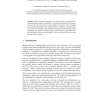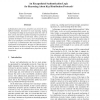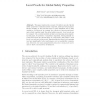115
click to vote
CAV
2010
Springer
15 years 2 days ago
2010
Springer
Abstract. Proofs of progress properties often require fairness assumptions. Incorporating global fairness assumptions in a compositional method is a challenge, however, given the l...
111
click to vote
FOSSACS
2008
Springer
15 years 3 months ago
2008
Springer
Local reasoning about programs exploits the natural local behaviour common in programs by focussing on the footprint - that part of the resource accessed by the program. We address...
131
click to vote
CAV
2008
Springer
15 years 3 months ago
2008
Springer
Abstract. This paper develops a local reasoning method to check lineartime temporal properties of concurrent programs. In practice, it is often infeasible to model check over the p...
143
click to vote
CSL
2006
Springer
15 years 5 months ago
2006
Springer
Separation Logic is a sub-structural logic that supports local reasoning for imperative programs. It is designed to elegantly describe sharing and aliasing properties of heap struc...
136
click to vote
CSFW
2005
IEEE
15 years 7 months ago
2005
IEEE
Authentication and secrecy properties are proved by very different methods: the former by local reasoning, leading to matching knowledge of all principals about the order of their...
112
click to vote
ACSAC
2005
IEEE
15 years 7 months ago
2005
IEEE
In this paper, we present techniques for a network forensics analysis mechanism that includes effective evidence presentation, manipulation and automated reasoning. We propose the...
134
click to vote
CAV
2007
Springer
15 years 8 months ago
2007
Springer
This paper explores the concept of locality in proofs of global safety properties of asynchronously composed, multi-process programs. Model checking on the full state space is ofte...
122
click to vote
LICS
2008
IEEE
15 years 8 months ago
2008
IEEE
Separation logic involves two dual forms of modularity: local reasoning makes part of the store invisible within a static scope, whereas hiding local state makes part of the store...



